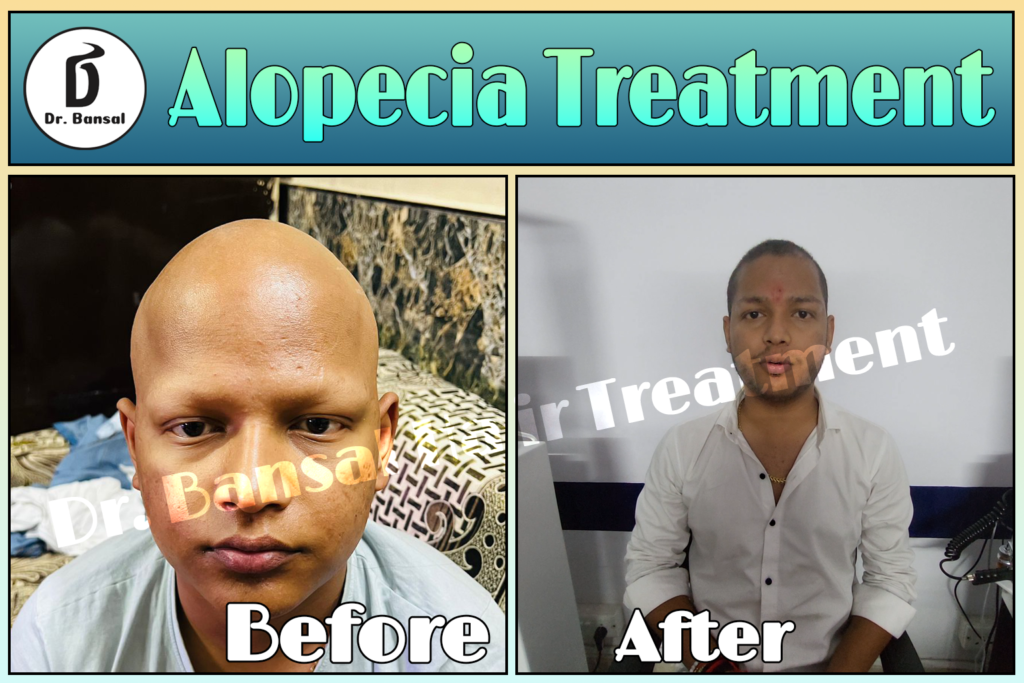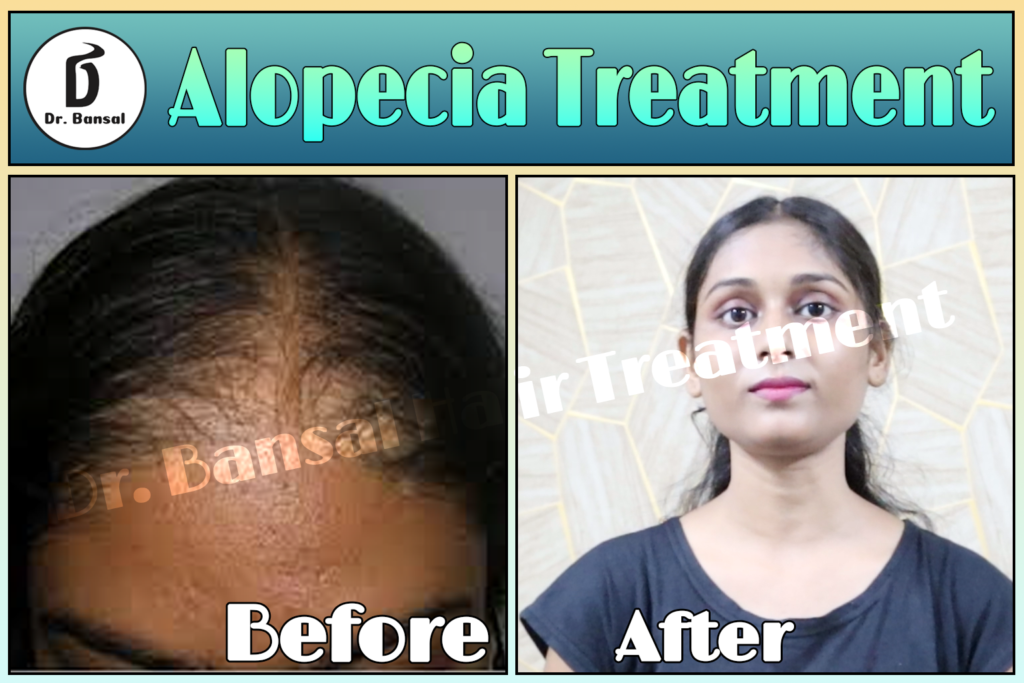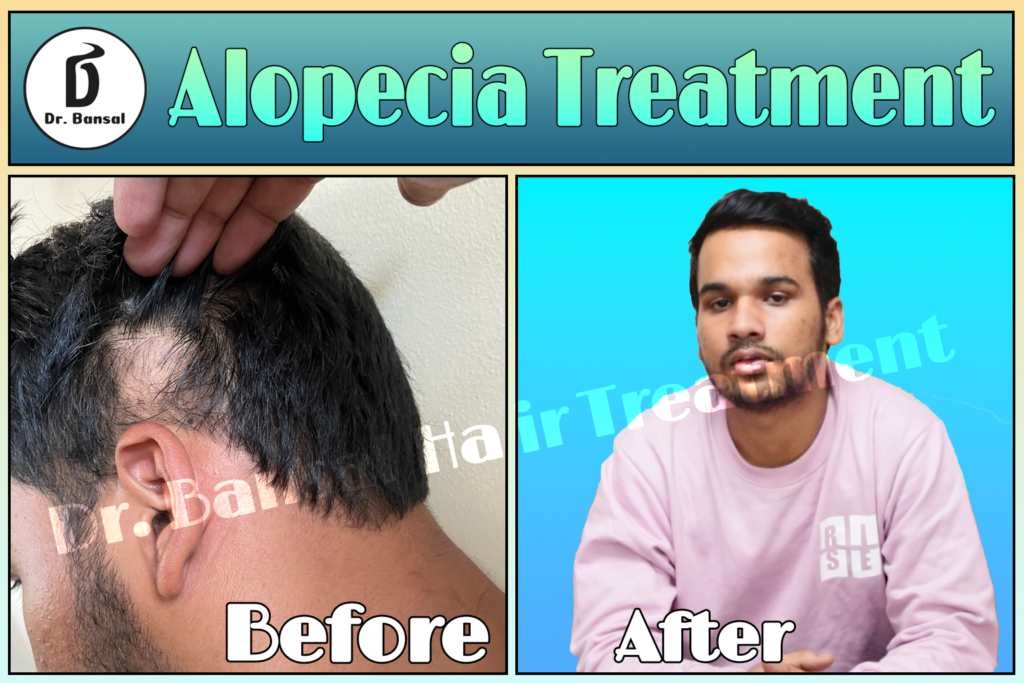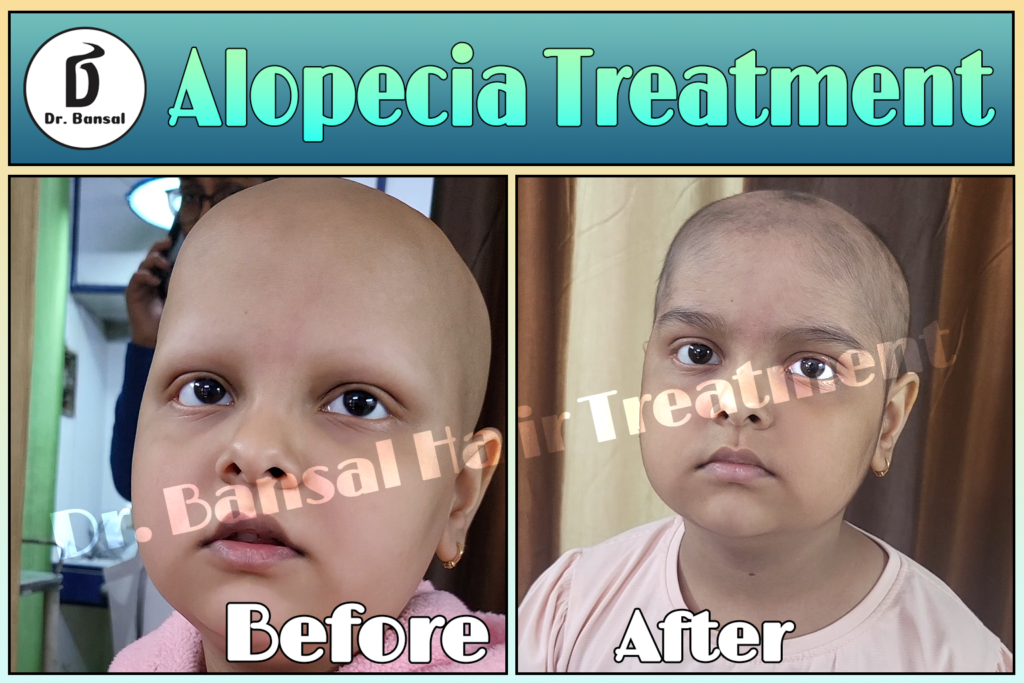Natural Treatment for Alopecia Areata by Dr. Bansal




Alopecia areata is an autoimmune condition characterized by sudden hair loss in patches. Natural Treatment for Alopecia Areata Though it can affect anyone at any age, the psychological and emotional toll it takes on patients is often significant. Traditional treatments for alopecia areata vary widely in effectiveness, and many individuals seek natural alternatives. Natural Treatment for Alopecia Areata
Thank you for reading this post, don't forget to subscribe!Dr. Bansal has dedicated years to researching and developing natural remedies for alopecia areata, focusing on holistic approaches that restore balance to the body and promote hair regrowth. Natural Treatment for Alopecia Areata This comprehensive guide delves into Dr. Bansal’s perspectives on the condition and offers various natural treatment options. Natural Treatment for Alopecia Areata
Understanding Alopecia Areata
Alopecia areata occurs when the body’s immune system mistakenly attacks hair follicles, disrupting the hair growth cycle. It can present as solitary patches or, in more severe cases, total hair loss (alopecia totalis) or complete loss of all body hair (alopecia universalis). Natural Treatment for Alopecia Areata
While the exact cause is still unclear, genetic predisposition, environmental triggers, and stress are thought to contribute to its onset. Understanding these factors is crucial for developing effective natural treatments. Natural Treatment for Alopecia Areata
Holistic Approach to Treatment
Dr. Bansal emphasizes a holistic approach when treating alopecia areata. This includes assessing underlying health issues, balancing hormones, optimizing nutrition, and incorporating lifestyle changes. Natural treatments often focus on boosting the immune system, reducing inflammation, and promoting hair follicle health. Natural Treatment for Alopecia Areata
1. Nutritional Support
Nutrition plays a foundational role in restoring hair health. Dr. Bansal advocates for a diet rich in vitamins, minerals, and antioxidants that can help strengthen hair. Natural Treatment for Alopecia Areata
- Vitamins and Minerals:
- Vitamin D: Supports hair follicle cycling. Sunlight exposure or supplements may help.
- Biotin: A B-vitamin that strengthens hair and nails and may improve growth.
- Zinc: Essential for hair tissue growth and repair. Foods like nuts, seeds, and whole grains are good sources.
- Iron: Low iron levels can contribute to hair loss, making proteins and greens rich sources vital for recovery. Natural Treatment for Alopecia Areata
- Antioxidant-Rich Foods:
Incorporating fruits and vegetables, especially those high in antioxidants (like berries, leafy greens, and citrus fruits), can help reduce oxidative stress and inflammation. Natural Treatment for Alopecia Areata - Healthy Fats:
Omega-3 fatty acids found in fish, flaxseeds, and walnuts can enhance hair health by combating inflammation.
2. Herbal Remedies
Herbal medicine has been utilized for centuries in various cultures to treat hair loss. Dr. Bansal has identified several herbs that may be beneficial for individuals with alopecia areata:
- Saw Palmetto: Often used to balance hormones. Some studies suggest it may help in reducing hair loss caused by hormonal imbalances.
- Ginseng: Known for its ability to stimulate hair follicles and improve blood circulation. Natural Treatment for Alopecia Areata
- Aloe Vera: Renowned for its soothing properties, aloe vera can help soothe the scalp and promote hair regrowth.
- Gingko Biloba: Believed to improve blood circulation to the scalp, potentially aiding in hair regrowth.
- Turmeric: With its powerful anti-inflammatory properties, turmeric may help in reducing the scalp inflammation associated with alopecia areata.
Preparation and Application:
Herbal treatments can be applied topically as oils or masks. For instance, mixing aloe vera gel with a few drops of essential oils and massaging it into the scalp can enhance both hydration and nourishment.
3. Scalp Massage
Scalp massage is a simple yet effective natural treatment that increases blood flow to the hair follicles. Dr. Bansal recommends regular scalp massages to promote circulation, which can help in nutrient delivery and hair revival.
- Technique: Use your fingertips to apply gentle pressure in circular motions over the entire scalp for about 10 minutes daily. Essential oils, such as rosemary or lavender, may be added to enhance the effects and improve mental well-being.
4. Stress Management
Given the potential link between stress and alopecia areata, managing stress effectively is a vital component of treatment. Dr. Bansal advises adopting stress-reduction practices such as:
- Mindfulness Meditation: Practicing mindfulness meditation can reduce stress levels, which may ease the autoimmune response affecting hair follicles.
- Yoga and Tai Chi: These practices not only reduce stress but also improve physical health and flexibility, which may indirectly support hair health.
- Regular Physical Activity: Exercise enhances blood circulation, reduces stress, and promotes overall well-being.
5. Essential Oils
Essential oils have garnered attention for their potential benefits in hair care and can be a valuable natural treatment for alopecia areata.
- Rosemary Oil: Contributes to improved circulation to hair follicles and may stimulate hair growth.
- Lavender Oil: Known for its calming effects, it may also promote hair growth when used regularly.
Application Tips:
Mix essential oils with a carrier oil (like coconut or jojoba oil) and massage it into the scalp. A few drops of these oils can also be added to shampoos or conditioners.
6. Lifestyle Changes
Adopting healthier lifestyle habits can profoundly influence overall health and well-being. Dr. Bansal highlights several lifestyle changes that can support hair health:
- Adequate Sleep: Quality sleep is crucial for immune system health. Aim for 7-9 hours of restful sleep per night.
- Hydration: Drinking sufficient water supports cellular function and may improve hair health.
- Avoiding Harsh Chemicals: Steering clear of hair products containing harsh chemicals can help minimize scalp irritation and preserve natural oils essential for hair health.
- Smoking Cessation: If applicable, quitting smoking may improve blood circulation and enhance nutrient delivery to hair follicles.
7. Homeopathic Remedies
Homeopathy offers a tailored approach to treating alopecia areata based on individual symptoms and overall health. Dr. Bansal often integrates homeopathic remedies, considering them complementary to other natural treatments.
- Lycopodium: Used for individuals showing early signs of hair loss, it may help stimulate growth.
- Phosphorus: Beneficial for patients experiencing thinning hair, it is thought to regenerate hair follicles.
- Silicea: Known for strengthening hair and nails, it may support recovery in individuals with fragile hair.
8. Ongoing Research and Patient Education
Dr. Bansal is deeply committed to ongoing research and education regarding alopecia areata and natural remedies. Staying updated with the latest studies helps guide his treatment practices.
Patient Engagement:
Dr. Bansal emphasizes the importance of involving patients in their treatment journey. Educating individuals about their condition empowers them to make informed choices regarding their health and encourages adherence to natural treatment protocols.
Conclusion
Alopecia areata can be a challenging condition to navigate, but Dr. Bansal’s natural treatment approach provides hope and avenues for recovery. By focusing on nutrition, herbal remedies, stress management, and holistic lifestyle changes, individuals can foster a nurturing environment for hair regrowth.
While results may vary, the integration of these natural treatments can lead to improved healthcare outcomes and enhanced emotional well-being. Patients are encouraged to consult with healthcare professionals before starting any new treatment regimen, ensuring that their approach to managing alopecia areata is safe and well-informed.
By understanding and embracing a comprehensive, natural approach to treating alopecia areata, individuals can reclaim their confidence and support their hair regrowth journey.

